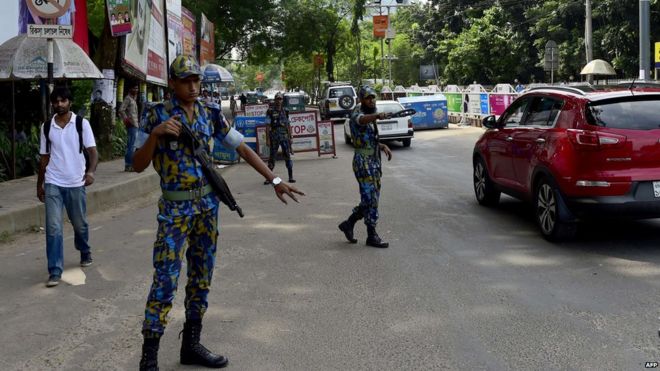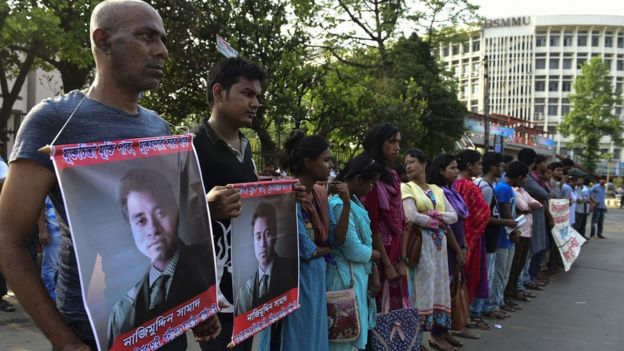 Tight security has been in place since the wave of attacks began
Tight security has been in place since the wave of attacks began
Bangladesh police say they have detained about 900 suspected militants following a series of attacks on minority and secular citizens.
Police launched operations overnight against Islamist extremists suspected of involvement in the attacks.
About 40 people, including secular bloggers, academics and members of religious minorities, have been killed in attacks in the past few years.
On Friday, a Hindu monastery worker was hacked to death in Pabna district.
Nityaranjan Pande, who was in his 60s, died on the spot after several people attacked him, reports said.
In the past week, a Hindu priest, a Christian grocer, and the wife of an anti-terror police officer were all killed in attacks by suspected militants.
Secular bloggers, academics, gay rights activists, and other members of religious minorities are also among those to have been killed in recent months. Regular protests have been held following the attacks on secular bloggers and minorities
Regular protests have been held following the attacks on secular bloggers and minorities
 Regular protests have been held following the attacks on secular bloggers and minorities
Regular protests have been held following the attacks on secular bloggers and minorities
Police have made a list of suspects wanted for more than 40 targeted killings over the past three years, based on intelligence reports, a senior police officer, who asked to remain anonymous, told BBC Bengali.
About 900 suspects had been arrested and the number could increase further, the officer added.
Correspondents say some of the suspects are expected to be freed after questioning.
Some observers say the killing of a police officer's wife may have triggered the crackdown.
Shahidul Hoque, inspector general of police, vowed on Thursday that those responsible for killing her would be "brought to justice very soon".
Bangladesh has a majority Muslim population with Hindus making up about 8%.
Who is being targeted?
Secular bloggers, academics, gay rights activists, and members of religious minorities including Shia, Sufi and Ahmadi Muslims, Christians and Hindus have all been killed, many of them hacked to death.
A university professor whose family said he was not an atheist was murdered in April, suggesting the list of those at risk had widened further.
Who exactly is behind the attacks remains unclear. Bangladesh has myriad extremist groups and there have been few convictions over the attacks.
Many of the attacks have been claimed by so-called Islamic State (IS) or al-Qaeda linked groups.
However, the government has disputed these claims. Instead, government members have blamed opposition parties and local Islamist groups. Bangladesh's home minister has suggested an Israeli link to the killings, describing an "international conspiracy" against Bangladesh.
Both the opposition and the Israeli government have denied any involvement - and Israel described the accusations as "utter drivel".
Until the killings stop the government itself will face accusations of not doing enough to protect minorities in the Sunni-dominated nation.
No comments:
Post a Comment